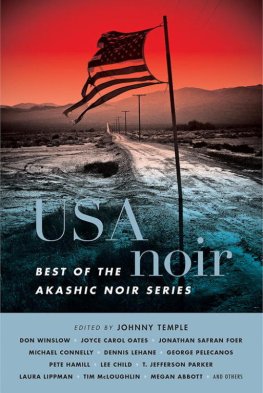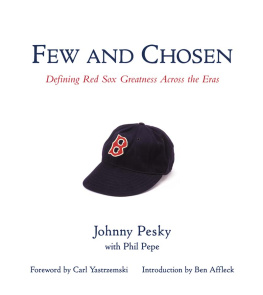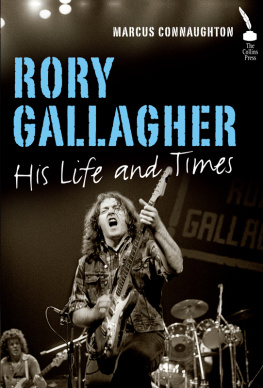First and foremost my thanks extend to the contributors involved in the writing of this tome. Despite payments exchanged, these were generally less than handsome and, to a man or woman, the call of reward was exceeded.
So without further ado, please say it one time for; Greil Marcus, Judy Nylon, Clinton Heylin, Pat Gilbert, Kris Needs, Alan Clayson, Barb Jungr, Legs McNeill and Nigel Williamson.
The troops at Chrome Dreams deserve more than a mention, most notably; assistant editor Jake Kennedy, graphic designers Sylwia Grzeszczuk and Aneta Fuks, layout and IT director Marek Niedziewicz and Projects Manager Angela Turner. Regrettably, for now, thats all thats on offer.
Special thanks go to Alan McGee for a foreword that quite says it all, and a generosity that, in a different light, does too. In this regard, please also raise a glass for Vanessa B, the classiest PA in the business.
Extra special thanks go to Kris Needs and Judy Nylon for general assistance with the project and endless supplies of good natured responses to all manner of questions.
Afterword
by Rob Johnstone
Its July 4th 2006. Independence Day passes pretty much unannounced in territories outside of North America. The weather in the UK is as blistering as it was 30 years ago and over coming weeks temperatures will top anything 1976 had to offer. The hosepipe ban is in force again this year, but now everyone knows why its so darn hot!
Political discontent today relates more to foreign policy than anything out-of-the-ordinary on the home-front; and while theres still a million people out of work in Britain, the goalposts have moved exponentially over intervening decades and such a level is now considered rather low - bearing in mind during the early 1980s it ran at 3 times this figure. There are two main issues on the agenda right now that cause major concern to much of the population. One is the state of the earth and whether we can reverse the effects of everything weve been doing wrong since the industrial revolution. But with the majority of those who are employed in the affluent world almost addictively spending money they havent got on things they dont need, the future for subsequent generations looks bleak. The other is the ongoing threat of terrorism, which now seems a thousand times worse than that faced by British mainlanders in the mid-70s, when the Troubles in Ireland had only recently spread to Great Britain.
On this day in 1976, as stated at the beginning of this book, punk was only just kicking off in England, but since the beginning of 2006 every monthly rock music magazine, and the one remaining weekly, have been putting out Punk Specials, in commemoration of that oeuvres Diamond Jubilee, as if their circulations depended on it: by April, unsold copies had been sent back to the publishers. The rather accurate types who edit these periodicals, for once seemed unconcerned with exactitude, instead employing a first-past-the-post regime to signal their credentials in this arena.
While this approach is somewhat understandable and can be seen either as sharp commercial practise or cynical marketing, depending on which side you dress (either way a window still exists for further excursions later in the year), it says more about punk itself than thecompilers of these collectors items. What was often considered a necessary but short lived novelty at best, an ugly undignified era of rudeness and loud shouty records at worst but in any case one that was over in the time of a seasonal sale, a stock clearance and a special offer has tended to resonate loudly ever since; but never as loudly as it does today.
The nostalgia trend of course greatly contributes to this deluge of ephemera, but last year saw the 50th anniversary of rocknroll itself surely a more significant event in the diary of modern music but nary a mention in any one of these journals was witnessed with the exception of Elvis Presleys achievements, acclaimed for far more than his first few records. Likewise, the hippy movement and associated trends have had any number of potential celebrations open to them over recent years, and while there still is plenty of coverage for this era in its various guises, it doesnt come close to the plethora of punk outpourings.
One of the first things I was ever quoted as saying was I d like to see more bands like us. Right? When I said that, I didnt mean exactly like us. Unfortunately thats what happened. Imitations. Billions of them. And I wanted nothing to do with any of them. There were a few originals, but not many. John Lydon 1977
John Lydon came to hate punk as soon as the multitudes cottoned on. When it existed as an underground movement of true originality and, to a certain degree, an extension of his own persona, his contributions were delivered proudly. Once it became the inevitable rule book of dos and donts and it presumed a limited outlook, it was as good as finished as far as he, and, to be fair, others from punks sharper edge, were concerned.
As Lydon was pivotal to the necessary emergence of punk, he was equally important to its downfall or more accurately, its evolution. A feebler soul would perhaps have considered the commercial potential of stringing it out a couple more years and shut up about trivial grievances, but Johnny wasnt of that ilk. Of the various factors that contributed to the Sex Pistols split in early 1978 which prompted so many others involved to move on, give up ormutate none was so important as Lydons feeling that quite what it was he had contributed to punk so eloquently, was no longer appreciated. One of John Lydons musical inspirations, Neil Young no fool himself used Lydon as the subject for his all too good advice, Its better to burn out than to fade away a year later. But Lydon knew that already.
So when he found himself without a band, less than three years after hed first been elbowed into one, as a non musician, a rather acquired vocalist, and a songwriter who couldnt work alone, he may have found it difficult to envisage many options.
After the Pistols, John was legally forced to revert to the name on his birth certificate or at least something not ending in Rotten due to the immediate freezing of any assets associated with Malcolm McLaren and his limited company, Glitterbest which, it appears, included John Lydons nom deverything for the past 30 or so months. But that suited him fine; enough is enough after all and the return of the artist formerly (un) known as John Lydon, in the latter half of 1978, was, if anything, embellished by the use of his non-punk associated family name.
The years that followed, in Lydons new and just as radical collective PiL, are covered expertly and in-depth at the core of this book, but what is interesting about his pioneering role in what has come to be termed post-punk, is that, both in historical terms and in punk-rock itself, there was nothing to suggest it was going to happen. In the wake of rocknrolls first wave, which itself burnt out in as short a timespan as punk, came a barrowload of nancy boys with a watered down, limp and soggy rendering of the form. The wild beasts that comprised the cream of rocks awakening were not replicated. With a few notable exceptions, it would take the best part of a decade for a new galaxy of brighter stars, infused with the rock ethic, to come up with something of their own.
But with punk being just as startling and life-changing as rocknroll, 20 years before, it had the same sense of an all encompassing movement; an era of its own with little to recommend it beyond its presumed natural cycle. That it merged into any number of valid follow-on movements New Wave, Ska (and to a lesser extent, Mod) revivals, Power-Pop, New Romanticism, Liverpoolsnew-Psychedelia and perhaps its most logical descendant, Post-Punk until recently virtually undocumented but now more fashionable a form to namedrop than anything else from the rock era is quite astonishing. Each of these media-tagged styles had their share of the good, the bad and the much in-between, but such a generally positive fallout should anyone during those amphetamine fuelled months have had the capacity to sit down and think about it was wholly unexpected.













